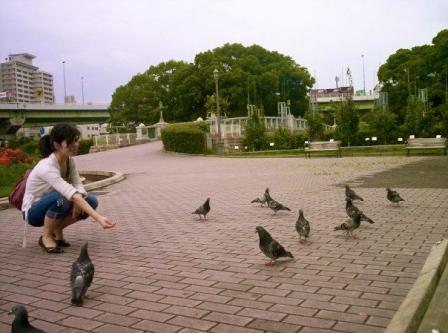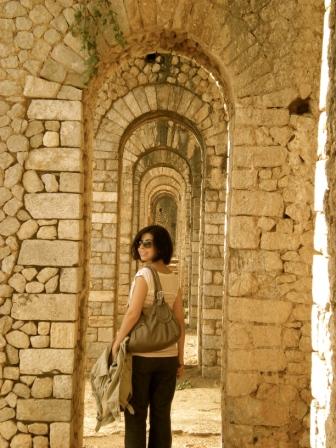From Boston to Osaka to Italy: I Eat My Pigeon
 Call me Liv. I’m American. I was born in Boston, Massachusetts, grew up in Crystal River, Florida, and then I moved to New York City to attend university. I stayed in the city for eight years. Then I moved to Osaka, Japan. Then I moved to Dublin, Ireland. Now I live in Terracina, Italy. It’s a small town on Italy’s west coast, on the Tyrrhenian Sea. It’s the town where my parents met and fell in love as teenagers. It’s a funny thing living in the town where your parents fell in love. Sometimes, I see teenagers making out on the beach. My first thought is: “Aww. Young love.” My second thought is: “Those could have been my parents.” And then I throw up in my mouth a lot. But then I clean myself up. Try to be grateful. This town is, after all, where my life began.
Call me Liv. I’m American. I was born in Boston, Massachusetts, grew up in Crystal River, Florida, and then I moved to New York City to attend university. I stayed in the city for eight years. Then I moved to Osaka, Japan. Then I moved to Dublin, Ireland. Now I live in Terracina, Italy. It’s a small town on Italy’s west coast, on the Tyrrhenian Sea. It’s the town where my parents met and fell in love as teenagers. It’s a funny thing living in the town where your parents fell in love. Sometimes, I see teenagers making out on the beach. My first thought is: “Aww. Young love.” My second thought is: “Those could have been my parents.” And then I throw up in my mouth a lot. But then I clean myself up. Try to be grateful. This town is, after all, where my life began.
1. Why did you move abroad?
My parents are immigrants from Italy and Guatemala and most of their friends are immigrants, too, so I suppose I always had that “follow-your-heart-to-adventure-and-a-better-life” example to look up to. Our house was always filled with at least three languages at a time, and even more kinds of delicious multicultural foods. But while I loved to travel, expatriating never remotely entered my mind until January 2006. Prior to that month, I was a committed New Yorker; convinced I’d live in my beloved adopted city until the day I died. But even though I loved my city, I was frustrated: a would-be writer suffering from an eight-year case of writers’ block, scraping by financially as a copyeditor for a marketing firm. I hated my job, hated the hours, and above all, hated the fact that I wasn’t embracing my dream of becoming a novelist. I knew that something had to change, but I couldn’t figure out what. Then one morning at the office – 3 a.m., to be precise – I snapped. If I wanted to be different… I had to be different. I’ve never been one to do things halfway; if I was going to bank on “change” as a means of dislodging my writers’ block, I wanted total change. I began making plans to get out of dodge immediately and settled on teaching ESL; it seemed like the easiest way to find a job and get legal in a foreign country. I worked overtime for a year to save up funds, sold my things, and got TEFL-certified. I chose to move to Japan because a) a reputable company offered me a job and b) I’d never had an interest in living in Japan. I knew by this point that what I needed in my life was extreme challenge, and moving to a country where I knew practically nothing about the culture seemed like a great way to inspire myself creatively. I arrived in Osaka in January of 2007; dazzled by new sights, smells, and sounds. What can I say? Moving halfway across the world to dislodge my writers’ block was, perhaps, a tad dramatic but it worked. I started a blog. I wrote the first draft of a novel. And I fell utterly in love with Japan.
I did not set out to become a serial expat. I thought I’d stay in Japan – tops – for a year and then go back home to my old life. But shortly into my stay, I fell in love with another teacher – a Maths-and-karate-obsessed Irishman. One year in Japan turned into two-and-a-half, and then we decided to move to Ireland together. He would teach Maths. I would get my master’s in Creative Writing at Trinity College Dublin. It was a romantic gamble. We took a shot. It didn’t work out.
After I finished my master’s, I knew I didn’t want to go home; I loved living abroad too much. Moving to Italy seemed like a good bet because I’m fluent in Italian, am an Italian citizen, and could stay in my grandparents’ apartment. This is a beautiful town; a Roman temple up on a hill and a profile-shaped mountain range that seems to float on the sea. I’ve been here a year now, making roots. So there you have it: five and-a-half years after I snapped in my Park Avenue office, a master’s degree in Creative Writing, a nearly-finished novel, and zero intentions of repatriating.
2. How do you make a living (working? Tell us about your experience)?
How I make a living changes depending on the country I live in, but there is a common thread: teaching English and freelance writing. When I lived in Japan, I worked for a large eikaiwa – an English conversation school – so I wore a suit to work, held regular hours, and was paid well. When I lived in Ireland, I used my savings from life in Japan to fund my graduate school degree, freelance travel writing on the side. Now, in Italy, with the degree behind me, I freelance travel write and teach English on the side. I’m working part-time now because I’m writing the final draft of my novel, and will return to working full-time when I finish it this winter. If you hear of any editing jobs that employ telecommuters, holla atcha girl.
3. How often do you communicate with home and how?
I talk to my friends and family back home every day through the Internet. A lot of people talk about the “good ol’ days” but, boy, not me – my lifestyle wouldn’t be remotely possible if I lived in a different decade, let alone a different century. It’s staggering how the expat experience has changed in such a short amount of time; when I was growing up, my parents communicated with my grandparents through handwritten letters or sporadic scratchy overseas phone calls. Now, though the magic of webcams, I can show my friends every single item on my desk, or what I’m planning to wear when I go out dancing.
4. What's your favorite thing about being an expat in Italy?
Out of all the countries I’ve lived in, Italy is by far the most receptive to Americans. Many Italians have relatives who’ve immigrated to the States, or they’ve grown up listening to fairytales of New York. There exists a glamorized view of America that I didn’t encounter in either Japan or Ireland, (witness the popular songs Tu vuò fa’ l’Americano – You want to be like an American? - or Pecchè nun ce ne jammo in America? – Why can’t we all go to America?). While the glamour is largely based on outdated myth, it’s still a refreshing change to hear “I love Big Apple!” when I tell people where I’m from as opposed to “You know, this whole pub is older than your entire country.”
Also, it’s really, really, really pretty here and I eat really, really, really well.
5. What’s the worst thing about being an expat in Italy?
Nothing. Freaking. Works. I’m talking little things we take for granted in other countries, such as streetlights on winding mountain roads or parking meters that function. Services like public transit, the postal system, and the police force are largely unreliable. Broken objects take ages to be fixed (there’s a stoplight at a big intersection in my city that was on the blink for months), setting a deadline appears to be a mere formality (“Yeah, I said it’d be done by today but I was wrong. Come back next week”), and transit strikes are frequent. Example: My contact lenses were confiscated by customs and I had to fill out a 5-page form to get them back. It’s been 2 months and I’m still waiting for them. Example 2: Some drunken idiot rammed into my parked car a couple of weeks ago and when we called the police, they refused to come because no one was hurt. When I went to the police station the next day to complain, dude takes a phone call in front of me and says into the receiver: “What? Someone’s threatening you? Well, just don’t open the door.” It can be funny in retrospect but sometimes not being able to depend on public services can get really frustrating.
6. What do you miss most?
People, faces. Public systems you can count on. Cupcake bakeries. Dill pickles.
7. What did you do to meet people and integrate in your new home?
When I lived in Japan, I was working for a large company so a support system and network of acquaintances was already in place when I arrived. In Ireland, I was getting my master’s so I met a lot of great people through the university system, as well as through my then-boyfriend. My move to Italy was surprisingly difficult in terms of finding a social network. I had expected it to be far easier, as my parents are from this area and I speak Italian. But I work freelance – no office or university classroom to facilitate connections - and a foreign woman who lives alone isn’t exactly viewed with a kind eye in a small Italian town. I spent a lot of lonely nights the first few months I lived here, pressing my hands against windowpanes and watching groups of friends clinking wine glasses. But if you make one friend here in Italy, you’ve already made a network so I got lucky; met one terrific person and was introduced to loads more. It took a while but now I get to clink wine glasses, too. And go for hikes in the mountains. And go dancing! You can live in paradise, be gorgeous and rich, but if you have no one to share it with, what’s the point?
8. What custom/ habits do you find most strange about your adopted culture?
Unmarried adults living with their parents. To be fair, however, most Italians think unmarried adults who live alone are freaks or prostitutes. I’ve learned the hard way not to tell anyone that I live by myself.
9. What is a myth about your adopted country?
Given that Italy is such a romanticized country overseas, there are many myths but I’d say that the biggest myth about Italy overseas is that Italy is paradise. There are loads of fantastic things about this country and culture – the cuisine, the natural scenery, fashion, the contribution to global history – but – and I’m sorry to have to break this to you - there’s no such thing as paradise. Yes, this is a beautiful country but if you’re actually living here, all the typical difficulties life has to throw at you come into play. We have rain, cold, depression, crime, family strife, economic crisis, and suicide. Unless you live on air, you have to work – if you can find a job, that is (the unemployment rate hovers around 8%). My Italian friends complain constantly about how the country is going to hell. The government! Berlusconi! Say no to nuclear power! Let’s all move to America with Liv! Sorry, folks; Italy’s just like any other place – awesome and crappy all at once.
10. What advice would you give other expats?
Please learn the language. I already spoke Italian before I moved here, but when I moved to Japan in 2007, I knew how to say “My name is Liv,” “Where is the train?” and the names of fish used in sushi. I had always planned to learn Japanese while I was living in Osaka, but I had no idea how challenging it would be or how long it would take. Not speaking Japanese made everything 100% harder: reading menus, navigating the social scene, signing up for Internet, getting health insurance. Learning Japanese was, at times, severely frustrating but, overall, an exciting challenge. On my first day in Japan, I couldn’t count to ten; on my last day in Japan, I conducted a bank transfer.
There is a prevalent belief among Americans that learning other languages is unnecessary because “everyone speaks English.” This is untrue. Yes, English is a widely-spoken language, but it is by no means spoken by every citizen in the world. No one in my Italian family speaks English. In my Guatemalan family, 90% of my cousins speak English but none of the aunts and uncles do and certainly not my grandmother. When I lived in Osaka, most waiters could only say “Hello, what you want?” Here in Terracina, only a couple of my friends speak basic English. You get the picture. Widely-spoken, yes; universally-spoken, no. And even if you do find that “getting by” is easy in big cities, you’re still limiting yourself to expat culture. Learn the language; it’s not only respectful of your new country but you won’t believe the doors that open.
I almost forgot; there’s another awesome added bonus to learning the language of your new home. If you learn the language, you will also help reduce the instances where I have to have this conversation: What? You speak Italian? But you’re American; Americans won’t learn other languages. Do you understand me? Should I speak more slowly? Don’t just learn a new language for your own well-being and out of respect to your new culture: do it for me.
11. When and why did you start your blog?
I’d been blogging in various forms before I moved to Japan, but knew I wanted to make a new blog when I moved abroad to share my experiences with my friends and family. Terribly original, I know. I’ve been sharing my expat humiliations since January of 2007.
12. How has the blog been beneficial?
Apart from giving me a place to catalog my experiences – the early entries from my first days in Japan have become a precious time capsule and have the power to bring me to tears – writing my blog really helped me develop my writing. It has also boosted my confidence due to the positive feedback I’ve received from complete strangers who, in some cases, have become respected friends and colleagues. Because of all the kind words over the years, I finally got the courage to apply to get my master’s in Creative Writing. I did it! I graduated from Trinity College Dublin last April and that, more than anything, has completely revitalized my writing. I feel closer every day to achieving my goal of becoming a novelist. Thank you all for reading; your support has meant everything.

Liv's blog, I Eat My Pigeon

Find out more about being an expat in Italy with Easy Expat's
Part of the EasyExpat.com adventure since 2008. Drink, Travel, Write